| Article ID | Journal | Published Year | Pages | File Type |
|---|---|---|---|---|
| 981764 | Procedia Economics and Finance | 2014 | 8 Pages |
In the summer of 2007 the U.S. economy began to deteriorate, once the Lehman Brothers episode unraveled, despite numerous government interventions, U.S.A. and the European Union entered the recession. This study uses Markov chains to study the effects of the global economic crisis on European Union member states, taking into account the aspect of convergence. The first stage of the analysis is based on the indicator GDP/capita and we came to the conclusion that it cannot provide a comprehensive understanding of the crisis. This led to extending the analysis by including the following terms: Corruption Perceptions Index, Index of Economic Freedom, the government's external debt and FDI. Results of the analysis showed that the real growth was higher than the estimates made. Markov chain analysis also proved to be effective in revealing the trend of probability of belonging to groups meaning it can estimate a good trend for considered variables. European economic convergence has suffered from the economic crisis especially in financial terms.
